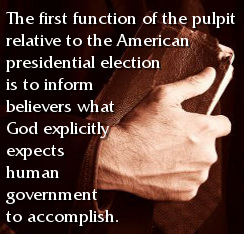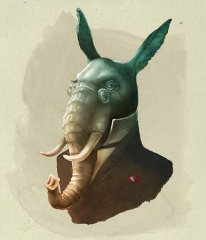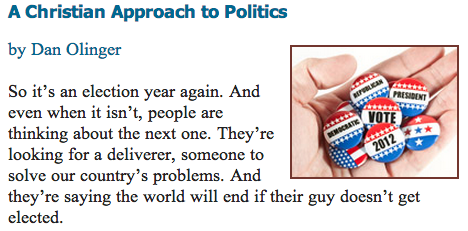Making Sense of It

To many of us the outcome of Tuesday’s election is incomprehensible. In multiple ways, it doesn’t make any sense. But if forty six years of life’s puzzles have taught me anything, it’s that when you’re inundated by the incomprehensible, it’s time to focus for a while on what is clear and certain.
Often enough the incomprehensible starts to make sense somewhere in that process.
Maybe you don’t need what follows, but I did. Just passing it along.
Four things that are still true after Tuesday
1. God is perfect and unchanging.
For I am the LORD, I do not change; Therefore you are not consumed, O sons of Jacob. (Mal 3:6)
Every good gift and every perfect gift is from above, and comes down from the Father of lights, with whom there is no variation or shadow of turning. (Jas 1:17)
Discussion
On the bright side, it's over
Body
“Some would consider this poisonous polarization. In truth, it’s where politics ought to be, with two parties on opposite sides ideologically. The disappearance of liberal Republicans and conservative Democrats was long overdue.” Good Riddance
Discussion
Reflections on Republocrat: Beck, Limbaugh, O'Reilly & Fox
Chapter 3 of Carl Trueman’s Republocrat focuses on American conservative Christians’ view of the media—with Fox news as the focus.
Though the chapter (The Not So Fantastic Mr. Fox) seemed shorter, it’s length is actually the just-shy-of-twenty-pages standard for chapters in this book. Perhaps the illusion of shortness is due to my skimming several pages when it became clear they held nothing of interest (the part arguing against the virtuousness of Fox Broadcasting Company and Mr. Murdoch; since I never thought they were especially virtuous, and don’t know anyone who does, I didn’t care).
But Trueman does make some solid points in the chapter. We’ll consider those before I return to the problems.
Bias
Fox News is indeed biased, as the chapter asserts—depending on how you define bias. Trueman observes, “I like to argue in class that in the writing of history, no one can be neutral” (p. 42). From there, he distinguishes (though doesn’t really differentiate) between bias and objectivity. But he is undoubtedly right that there’s never been a human being who looks at events and ideas with some kind of tabula rasa.
Full disclosure: since our family doesn’t value cable or satellite programming enough to pay the monthly fee, my exposure to Fox News has usually been in small bits in auto-repair shop lobbies, video clips on the Internet and the odd occasion where the cable channel takes over local broadcast news for a period.
Discussion
What’s the Vote About? And What Difference Does It Make?

At this moment, six states plus the District of Columbia recognize what they call marriages between partners of the same sex. Three more states will be voting on legislation or citizens’ initiatives that will also recognize same-sex marriage. On the other hand, nine states have statues specifically prohibiting same sex marriages, and another thirty prohibit the practice in their constitutions. This Tuesday, the citizens of Minnesota (my state) will vote on a constitutional amendment that defines marriage as between one man and one woman.
Opponents of the amendment have tried to challenge it as a civil rights issue. For them, homosexuality should be treated as a minority status. People are born with their “sexual orientation” and it is unreasonable (they say) to discriminate against them. Persons of the same sex don’t harm anybody else if they cohabit or marry, so any law that prevents them from marrying is discriminatory. Their slogan goes, “Everyone should have the right to marry.”
The debate, however, is not about the rights of same-sex couples. It is about power, force, and, ultimately, about the use of violence against citizens who will not cooperate in the mainstreaming of homosexual behavior. If you think this is an overstatement, think again.
We are not really deliberating the definition of marriage. Marriage is simply marriage, and it is always between a man and a woman. This is not opinion; it is fact. You can claim to be married to a car. You can claim to be married to a building. You can claim to be married to a microbe. But you won’t be. Ever.
Discussion
Pulpit Ministry & the Presidential Election, Part 2
 Posted with persmission from Theologically Driven.
Posted with persmission from Theologically Driven.
Discussion
Electoral Vote Contest
 In just over two weeks all the campaigning, debating, advertising and analyzing will be over and it’ll all be up the Electoral College.
In just over two weeks all the campaigning, debating, advertising and analyzing will be over and it’ll all be up the Electoral College.
As a little election-season fun, see if you can guess what the Electoral College result will be.
Discussion
Reflections on Republocrat: The Secularization of America

This post continues my chapter-by-chapter review of Republocrat, by Carl Trueman (Part 1, Part 2). The chapter in focus here is the second, entitled The Slipperiness of Secularization. It’s thesis is that the US may seem to be less secularized than Britain, but probably isn’t. The reason is that here in the US, the church itself has become secularized in many ways. Hence, even though church attendance and religious language are far more common here than in the UK, these do not reflect genuine Christian faith and practice. To put it another way, Britain only seems more secular because it is more authentic about its unbelief rather than dressing it up like we do here.
After brief introductory paragraphs, Trueman develops the chapter under these headings:
- America: The Exception? (p. 22)
- British Christianity: The Dying of the Light (p. 23-25)
- The USA: Secularization, Religious-Style (p. 25-28)
- Secularization: Subtle and Speciously Orthodox (p. 28-32)
- The Patriot’s Bible and Beyond (p. 32-36)
- The Celebrity Syndrome (p. 37-39)
- Conclusion (p. 39)


Discussion